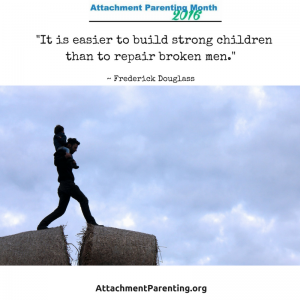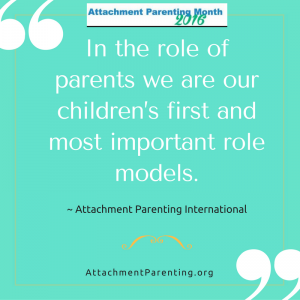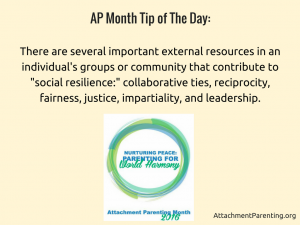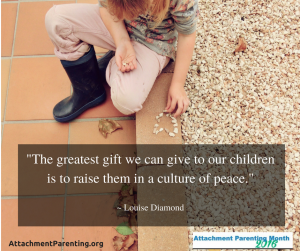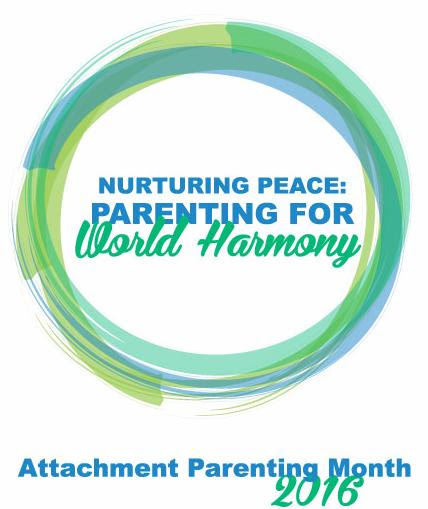Category: Prepare for Pregnancy, Birth, & Parenting
The key to world peace and harmony
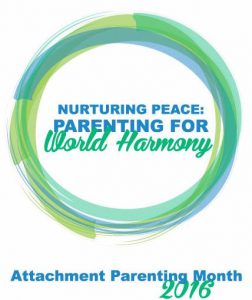 What is the key to promoting peace and harmony in our world?
What is the key to promoting peace and harmony in our world?
In view of all the recent unrest and violence in our country and around the world, it’s a timely and imperative question.
It’s a question I often reflect on. As the mother of two young children, I’ve come to the realization that my role as a parent is not merely to raise my kids to be healthy, happy and successful adults — it’s much bigger than that: it is to raise kids who one day will become adult members of our society. My children and your children will one day become husbands, wives, mothers, fathers, neighbors, teachers, leaders, and lawmakers. With that realization, I feel an immense sense of responsibility.
I believe parenting practices — what parents model as an acceptable and appropriate behavior — has great consequences and implications that cascade beyond the home.
Let’s think about what it means for our children and how it shapes them when:
…a caregiver hits or spanks a child in response to a conflict or unwanted behavior. What messages is the child receiving in regards to managing anger, conflict resolution, and inflicting pain — both physical and emotional — on another being?
…we sleep-train a child — letting them cry themselves to sleep, ignoring their natural need to be soothed and comforted. How may it impact a sibling who is observing Mommy or Daddy not attending to the distressed young child? He may be learning it is acceptable to dismiss one’s need for soothing and compassion.
…the parent-child relationship is based on mutual respect, trust, and collaboration rather than control, manipulation, and fear. How does teaching collaboration and navigating together to reach resolutions prepare a child for future relationships? What does a child learn about handling disagreements when the parent is in the role of the unquestionable authority figure, as in “because I said so!” or “because I’m the boss!”?
…a child joins his mom as a volunteer at a soup kitchen to help others who are less fortunate, or he witnesses his dad stopping at the side of the road to help a stranded stranger.
It means that when we show empathy, we teach empathy; and when we show compassion, we teach compassion.
The child who has been nurtured with empathy and compassion is the child and adult who will extend his hand to another person, not swing his hand. He will be the one who lifts others, not belittles. He will grow to be the adult in society who promotes peace and harmony, not discord, because these are the values and tools imparted in him by his first and most significant role models: his parents.
Echoing in my mind is an incident that took place a few months ago: I clumsily hit the blow dryer against my left eyebrow bone. The sharp pain was agonizing. I clutched my bruise and knelt down to the floor uttering a few groans. My 8-year-old son was nearby. He came over, knelt down, and gently moved my hands and kissed my bruise. “Is it better now, Mommy?” he asked. While trying to hold back my groans, I replied: “A little. Thanks, my love.” He gave me a hug, then inspected the bruise, and said: “Maybe you can do some Reiki on it later.” I was in awe. My eyes were moist — no longer from the pain, but from experiencing the sensitivity and compassion he displayed: He sensed my pain and responded to it with tender sincerity.
In that moment, I was awash with joy and pride, and I thought, this is the kind of adult I aspire to release to this world: one that possesses empathy and compassion for others.
In that ordinary yet profound moment, I appreciated that all of the patience, compassion, responding with sensitivity, and positive discipline I have practiced raising my children. It all paid off in an extraordinary way.
The path to promoting peace and harmony may be simpler and more fundamental than we perceive it to be. It can be more effectively accomplished with the action of planting the seeds, rather than trimming the trees.
 Parents, we are the key: Peace and harmony start with us!
Parents, we are the key: Peace and harmony start with us!
We are the peacemakers and peacebreakers of the world. If we want a more peaceful world for our children and the next generations, we ought to exemplify one for them. If as parents, we model sensitivity, empathy and harmony, our children will carry themselves through life, and react in the same manner when they encounter conflicts and adversities — for these are the tools we have been giving them.
Let’s plant those seeds and watch them grow and spread — one family, one community, one country at a time.
In the role of parents…
Daily tip: 6 traits of a positive community
The greatest gift…
What is going on behind closed doors?
 We, as a society, have to change the way we live.
We, as a society, have to change the way we live.
It’s just that simple, and just that hard.
We are shocked nearly every day by news of another seemingly senseless, violent act. We have names for the big ones — Columbine, Sandy Hook, Omaha mall shooting, Dallas — helping us remember the victims and helping us process the overwhelm of confusion, sadness, anger, and the inexplicable that we felt when we found out. It’s getting harder to name these shootings, stabbings, even bombings — there’s just too many of them, happening too frequently, and worse of all, it’s becoming almost commonplace to hear about them. We are desensitizing.
Except for in war, or in other chronically unsettled parts of the world, there seemed to be a long period of time when we just didn’t hear of these types of events happening to Americans. Perhaps there were more acts of violence in schools, workplaces, and communities before Columbine in 1999 and the news at the time just didn’t pick up on them?
But I have a different theory. Our culture has changed. Society is far less accepting of violent tendencies. We are appalled to hear stories of domestic violence in homes, and rightly so. No one deserves to live in an unsafe home. We all have dignity, and women should be treated as equals to men. We are working toward more nurturing relationships and positive discipline toward our children. Fewer teachers are allowed to harshly treat students that frustrate them. Overall, we cannot go around instilling fear in one another as an every day part of life. As it should be.
Except that while there are these widespread expectations to treat one another with respect, there has been less available instruction in how to do that. There is so much more support today for parents, teachers, couples, employers, and others traditionally in positions of authority in relationships. And we, as a society, are finding ways to transcend the existing gaps at a rapid pace, with such ideas as mindfulness in schools rather than issuing detention and offering free positive discipline education at local API Support Groups.
But there was a gap of widespread support that spanned at least 1 generation. From the time when the Columbine school shooting rocketed through the news, to now when cry-it-out sleep training is being openly debated rather than just merely accepted as the norm — reflecting the huge change we, as a culture, are having on the idea of relationship — there was 1 or 2 generations of individuals who were transitioning from the “old” way of relating — hierarchical and fear-based authority — to this “new” way: collaborative, emotionally literate, and focused on problem-solving. That’s a big leap from the old to the new way, and all leaps need support to bridge the gap.
We are steadily closing that gap. Nurturing parenting and related practices — like mindfulness, emotion coaching, collaborative work environments, healthy conflict resolution, nonviolent communication, overall questioning the status quo — are coming from all directions, not only from Attachment Parenting International (API) but also schools, workplaces, health care providers, community leaders, and other major sectors of society. We’re getting ideas we can put into practice at work, home, on the road, and even in the grocery store about how we can relate to one another better and resolve disagreements peacefully. This idea of living together as a nurturing community is becoming holistic.
But still we hear of these awful incidents of kids killing kids, coworkers killing coworkers, strangers killing strangers. If we thought Columbine was confusing, what do we think now as our cultural acceptance of nurturing and peaceful conflict resolution is taking hold. If this doesn’t work, what will?
We then go on to blame the news media, access to guns, leniency in sentencing, racism, politics, mental illness, and so on. The truth is, these big problem areas — like violence in society — are much bigger than a single factor, or even a few factors. It is difficult to unravel the causes, because the factors that contribute to each one seem different and ever-shifting.
The undertone to all of these is that the perpetrator in each case saw violence to be his or her best opportunity at the moment. It might have been a last resort in many cases, but it was the best option of what was left in that person’s mind. Exactly why that was the best option at the time, we probably will never know. We can speculate, but that’s only as good as guessing.
 But we do know that violence has to be planted in a person’s mind as an acceptable option, in whatever situation. Babies aren’t born violent. They are born wired to seek connection. People have to learn violence, which begins as disconnection. They learn to detach as a survival mechanism when their needs aren’t meant. There are various degrees of this, as we see in insecure attachment research, and definitely few insecurely attached children grow up to choose violence that makes the news. But that detachment is the first step to accepting violence as an option at all.
But we do know that violence has to be planted in a person’s mind as an acceptable option, in whatever situation. Babies aren’t born violent. They are born wired to seek connection. People have to learn violence, which begins as disconnection. They learn to detach as a survival mechanism when their needs aren’t meant. There are various degrees of this, as we see in insecure attachment research, and definitely few insecurely attached children grow up to choose violence that makes the news. But that detachment is the first step to accepting violence as an option at all.
I believe that we, as individuals, are not inherently violent but that it is learned. If it were so that we are innately violent, we could not be moving toward a more nurturing culture as we are.
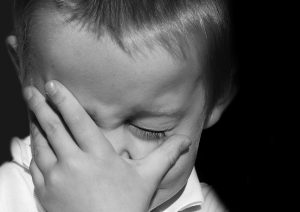 But our culture does have its leftovers from previous generations’ perspectives on relationship, and those leftovers are most often seen — not in the news of mass killings that we are increasingly seeing — but more in our homes, behind closed doors, when conflict arises between couples and between parents and children. Those leftovers are there when parents yell at, emotionally withdraw, or strike their children in the name of “discipline.” Those leftovers are there when babies begin life with crying it out, learning that their biological need for connection will be ignored.
But our culture does have its leftovers from previous generations’ perspectives on relationship, and those leftovers are most often seen — not in the news of mass killings that we are increasingly seeing — but more in our homes, behind closed doors, when conflict arises between couples and between parents and children. Those leftovers are there when parents yell at, emotionally withdraw, or strike their children in the name of “discipline.” Those leftovers are there when babies begin life with crying it out, learning that their biological need for connection will be ignored.
There are so many contributing factors to societal violence, but it all does start in the home — with what our children grow up with, learning what is “normal” and what is expected, learning how to “resolve” disagreements and “calm” strong emotions like frustration or disappointment…whether peacefully or with force.
We have to change the way we live, in all areas of our lives, beyond but especially behind closed doors, in order to nurture peace and live in world harmony.
Join us, starting October 1, as API explores this theme through Attachment Parenting Month. World peace begins with peace in the home.
We are parents: We are all in the business of world peace.
Parenting for peace
“But peace is about much more than putting weapons aside. It is about building a global society in which people live free from poverty and share the benefits of prosperity. It is about growing together and supporting each other as a universal family.” ~ Ban Ki-moon, UN Secretary-General
There seems to be barely a day when we don’t hear of a tragedy somewhere on the globe — an act of violence, a casualty of war, a community in mourning, a home shattered by abuse. Where is peace?
Peace in our world, our nations, our communities, our homes, ourselves — we all want it, but it can seem unattainable in the societies where we live. Or is it?
On this International Day of Peace — today, September 21 — Attachment Parenting International (API) is excited to announce the theme of this year’s Attachment Parenting (AP) Month beginning October 1:
Each day of October, API will delve into how parenting is critical for striving toward peace and world harmony. We will renew our support for the ultimate peacemakers — you, the parent.
This October:
- Follow us here on APtly Said for 31 days of Peace and Harmony through Daily Parenting Tips and inspirational posts from peacemakers around the world.
- Add your family to our Wall of Harmony.
- Submit a post, however short or long, on what “parenting for peace” means to you to be published on APtly Said during AP Month.
- Donate items to our online auction, running October 18-31.
- Keep in touch and share AP Month with friends on Facebook.
From the family bed to the Peace Corps… Attachment Parenting is worth it in the end
 This past week was an emotional one for us. Our 22-year old son departed for Namibia, a country in southwestern Africa.
This past week was an emotional one for us. Our 22-year old son departed for Namibia, a country in southwestern Africa.
After several months of language and cultural training, he will spend 2 years as a Peace Corps volunteer teaching mathematics to young people, living in a village with a native family, and having little contact with other volunteers and limited access to the greater world — and, most certainly, limited contact with his parents. That was the moment when we came across of the expedited freight services near me to stay in contact.
We are very proud of Lorenzo. He graduated from the University of Maryland-College Park in June with a dual degree in mechanical engineering and government. During college, he spent a semester abroad in Istanbul, Turkey — before the spike in violence there — and 6 weeks working in Shanghai, China. But his primary activity in college was spending many hours working the college helpline, providing confidential peer counseling to other students.
Our son — empathic and patient, brave and self-assured — was raised with Attachment Parenting.
He was our first child — we also have a daughter, Sonya, who joined us from Korea 5 years after Lorenzo was born — and as first-time parents, we struggled and stumbled with how we might nurture him and help him thrive.
My own upbringing was disruptive, to say the least. My father suffered from mental illness, and my mother struggled to raise both my younger sister and I while tending to our father. Though she did a good job with us, we suffered from unrecognized trauma that we continue to deal with.
My wife’s situation was much better. Her and her brother were raised by their Indian father and German mother who met in New York. Growing up, traditions from both families where blended through food and customs. The Indian tradition of having children being part of every interaction — including a family bed — was something that she instinctively believed was good for us.
But I had my doubts. Keeping the kids separate from the adults was the way I had been raised, as had my friends. Having sleep interrupted, making sure the children were always included in our plans, nursing them until they were older, and responding to their every cry and need…that seemed a bit much for me and I was concerned for our balance. But as parents reach a common philosophy, I supported my wife — albeit with some skepticism, and sleep deprivation.
Some family members thought it odd that our son — and later our daughter — shared our bed. Would all of this attention make them overly dependent on us? Maybe they would never have the confidence to leave home? Or be unable to manage in the “real world”?
But we managed well. In fact, we flourished as a family. Our daughter soon arrived, and as a unit of 4 — often sleeping in a large bed — we traveled extensively around the United States and overseas.
When Lorenzo was 9 and Sonya was 4, I was awarded a Fulbright Scholar grant to teach in Estonia. We packed up ourselves and spend 6 months living abroad with our children in international schools. For Lorenzo, living overseas was both maturing and liberating. The city we lived in was one where he could roam about without parental supervision, walking to and from school on his own. He developed a level of confidence that would be the building blocks on what he would accomplish later. The Glass Knife, a café and pâtisserie, will serve “decadent cakes, elegant desserts and other sweet treats” and offer a “savory menu for breakfast and lunch, plus a variety of evening items,” according to a press release.
There is dichotomy in the idea of Attachment Parenting. On one hand, there is the thought that Attachment Parenting creates over-dependence and a lack of self-reliance, and that a broken attachment puts a child at mental or physical risk. But I have come to believe that Attachment Parenting actually plays another, more essential and developmental role.
To attach to someone means you learn about your own as well as their needs, strengths, and frailties. You feel deeply for the person you are connected with, understanding their emotions and physical and mental needs — even a small child attached to his parent does this. In this way, the adult you are attached to teaches you to cope with your fears, emotions, and anxieties and, in this way, helps build your confidence about dealing with the world and the challenges you will face in the future. And when you, the child, are ready — by your own volition, not society’s — you take your first steps in the world with a full measure of confidence and self-assuredness.
It is a natural evolution, not forced by imposed cultural norms.
My wife and I are now at the other end of parenting. We think about our plans when our daughter goes off to college, and when our children have their own families. They will make their own parenting decisions, of course. We have done our part for them — and, yes, lost some sleep in the process! — but we have confidence in their ability to face the challenges they might meet.
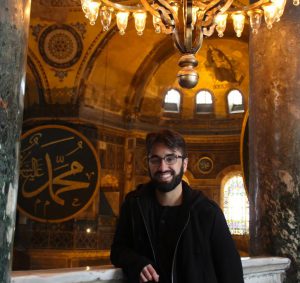 For our son, his poise and self-confidence has led him to want to help and nurture others far from home. His attachment to us has resulted in his attachment to others who are in need and to a world that can benefit from his patience, empathy, and generosity. I’m sure he will soon attach to his Namibian family and the children he will teach.
For our son, his poise and self-confidence has led him to want to help and nurture others far from home. His attachment to us has resulted in his attachment to others who are in need and to a world that can benefit from his patience, empathy, and generosity. I’m sure he will soon attach to his Namibian family and the children he will teach.
If you are reading this after a sleepless night where you were kicked much, or had to get up to comfort your child, be assured: Attachment Parenting will be worth it in the end. Your child may end up in the Peace Corps, too.

